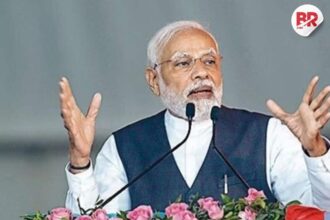
The Karachi Stock Exchange (KSE) has taken a significant hit, dropping by approximately 2%, as geopolitical tensions between India and Pakistan escalate.
This decline serves as a stark reminder of how closely financial markets are linked to global politics. When tensions rise between two nations, it’s not just diplomats who feel the pressure—investors react swiftly, and markets can plummet as uncertainty grows.

The Immediate Reaction
The KSE’s sudden dip highlights how sensitive the market is to political instability. In this case, the catalyst for the drop was the announcement of India’s potential retaliatory actions following the tragic Pahalgam terror attack. While details of these actions remain unclear, the mere possibility was enough to trigger a wave of selling in the market.
This uncertainty, often fueled by fear, can cause investors to reassess their positions and seek safer havens for their money.
As markets hate uncertainty, the mere announcement from India’s Cabinet Committee on Security (CCS) set off a chain reaction in the KSE. Investors, always alert to political developments, immediately began pulling back, leading to a noticeable downturn.
Also Read ₹20 Lakh Bounty, LeT Links: The Ruthless Chase for Pahalgam Attackers
What’s Behind the Market Decline?
Several factors contribute to this kind of market reaction:
- Investor Sentiment: As tensions rise, investors often become risk-averse. The fear of the unknown pushes them to sell off their holdings and park their funds in more secure assets like gold or US dollars.
- Economic Uncertainty: Retaliatory actions could severely impact trade relations between India and Pakistan, leading to disruptions in economic activities. This uncertainty can make it harder to predict future growth, especially for businesses that rely on cross-border trade.
- Regional Instability: The broader instability in the region can also scare away foreign investors. Foreign direct investment (FDI) plays a crucial role in economic growth, and any threat to regional stability makes the market less attractive to international investors.
The Larger Economic Picture
This market downturn should be viewed within the context of Pakistan’s broader economic challenges. The KSE has historically been sensitive to political events, especially when it comes to tensions with neighboring India. Any escalation in these tensions can easily turn into an economic crisis.
Pakistan’s economy is already facing significant hurdles, including inflation, rising unemployment, and a declining currency. With the added pressure of geopolitical instability, the country’s economic situation becomes even more precarious. In times like these, market declines are often the first sign that something deeper is affecting the economy.
Also Read India Suspends Visas for Pakistanis: What the Pahalgam Attack Means for Future Relations
What’s at Stake?
The consequences of this market decline extend far beyond just numbers on a screen. Here’s what could happen next:
- Reduced Investment: Prolonged uncertainty could discourage both domestic and foreign investment. The KSE, which relies on investor confidence, could struggle to attract capital if tensions remain high.
- Currency Pressure: The Pakistani rupee is likely to come under pressure as investors flock to safer currencies like the US dollar. A weakened rupee could lead to higher import costs, further fueling inflation.
- Higher Borrowing Costs: If investor confidence continues to erode, Pakistan could face higher borrowing costs on international debt markets. This would increase the country’s debt burden, making it harder to finance public services and infrastructure projects.
Looking Ahead: What’s Next for the KSE?
The future of the KSE depends heavily on how the situation between India and Pakistan unfolds. If both countries take steps to de-escalate and engage in dialogue, investor confidence could slowly return. However, if tensions escalate further, the market could experience even deeper losses.
In volatile times like these, it’s essential to keep an eye on the geopolitical landscape and its impact on financial markets. Investors need to be prepared for short-term volatility and adjust their strategies accordingly.
For those invested in the KSE or any other emerging markets, it’s a good time to assess risk tolerance and stay informed. As history shows, geopolitical tensions can have a rapid and profound impact on markets, but they can also be temporary if leaders work toward peace.
Also Read Pakistan Slams India’s Indus Waters Treaty Suspension as ‘Cowardly’—But What’s the Real Game?












